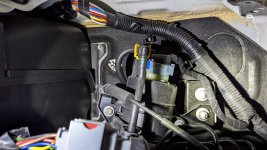I am trying to identify what the fuel filter is on my 2019 Euro6 Ducato fitted in a Carthago MH.
It looks nothing like the metal cased filters shown on the recent threads and not like the plastic casing on my old x250.
Can anybody help please…..
Thanks.
It looks nothing like the metal cased filters shown on the recent threads and not like the plastic casing on my old x250.
Can anybody help please…..
Thanks.


